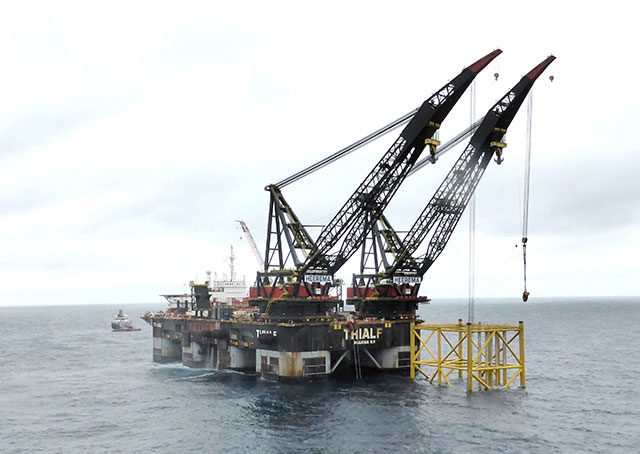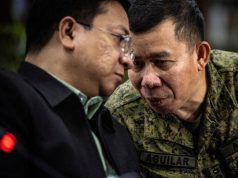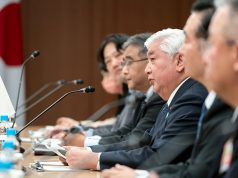Critics are flagging the planned joint oil exploration agreement between the Philippines and China, the draft to which was released to media outlets on Tuesday.
Sen. Antonio Trillanes IV released a draft of the exploration deal to media outlets on Tuesday, November 20, the first day of Chinese president Xi Jinping’s visit to the Philippines, which specified that the sovereign rights of both country’s would not be affected by the venture.
The draft, supposedly prepared by China, also states that the joint exploration would pave the way for another cooperation agreement on the exploitation of resources found should it be successful, with bilateral cooperation from the parties.
It is basically an agreement to agree at some other time in the future, as maritime law expert Jay Batongbacal explained on Twitter.
The China National Offshore Oil Corporation was entered as the Chinese enterprise assigned to the agreement. The name of the Philippine enterprise to be assigned for the venture was left blank.
A memorandum of understanding on 29 deals including oil and gas development was later signed by the two countries. Copies of the documents, however, have not been made public as of press time.
Trillanes along with fellow opposition member Sen. Kiko Pangilinan earlier filed a resolution to release a definitive draft of the oil deals before any agreement with China, previously the Philippines’ territorial rival to certain parts of the West Philippine Sea, was inked.
Some Filipinos expressed concern over the draft of the proposed deal.
1. Removal of Filipino subjects in college
2. Division of Palawan into 3 provinces
3. China-Philippines oil exploration deal in Philippine soilDivide and conquer. Gising Pilipinas!
— Rev Justice (@ItsRevOfficial) November 21, 2018
The Duterte government signed an agreement with China for the latter to do natural gas and oil exploration in WPS. This means that China can now do whatever it wants in the contested WPS in the guise of exploration. With Duterte's permission, of course.
— Al Dimalanta (new) (@al_dimalanta) November 21, 2018
🇨🇳🇵🇭's joint oil exploration 'deals' sorely missed crucial details **locations** without which China cannot claim to have 'set an example'. This is a smoke & mirror game where nothing is presented as everything. Again, aim to stampede us into acquiescence! https://t.co/FxKgg2c3xv
— SCS_Disputes (@SCS_Disputes) November 20, 2018
The Palace said that it will be scrutinizing any joint exploration deal with China.
“We assure that any agreement that we will enter into with a foreign government or entity would stand the judicial scrutiny of both countries and its constitutionality, if challenged, would be upheld,” presidential spokesperson Salvador Panelo said on Tuesday after the opposition senators filed their resolution.
The MOU signed between the two countries entails a lower level of commitment as such documents do not contain promises that can be legally enforced, unlike a memorandum of agreement.
Adding to the concerns?
Critics of President Rodrigo Duterte’s warm relations with Beijing despite the previous territorial dispute with China over the Spratlys Islands and other maritime areas have raised their concerns over Chinese enterprises’ presence in some recent projects.
Some questioned the confirmation of the Mindanao Islamic Telephone Company Group’s consortium, called Mislatel, as the third major telecommunications player in the industry a day before Xi’s trip to the Philippines.
China Telecommunications Corp., a state-owned telecommunications firm, is a member of the Mislatel consortium.
Those defending the selection of the Mislatel group explained that the presence of a foreign enterprise was valid, provided it complied with the 1987 Constitution’s limitation on foreign ownership in energy and natural resource transactions entered into by the Philippine government with corporations or agreements.
Sen. Juan Miguel Zubiri in November 2018 defended the selection of the Mislatel group over candidates by pointing to the National Grid Corporation of the Philippines, 40 percent of which was owned by a state-owned power company.
Article XIV, Section 2 says that 60 percent of the capital of such corporations must be Filipino-owned, limiting foreign ownership to 40 percent.
It also allows the Philippine state to transact with foreign corporations provided that the agreement involves “either technical or financial assistance for large-scale exploration, development, and utilization of minerals, petroleum, and other mineral oils.” The provision also requires that such ventures must be primarily beneficial for the promotion of local scientific and technical resources.










